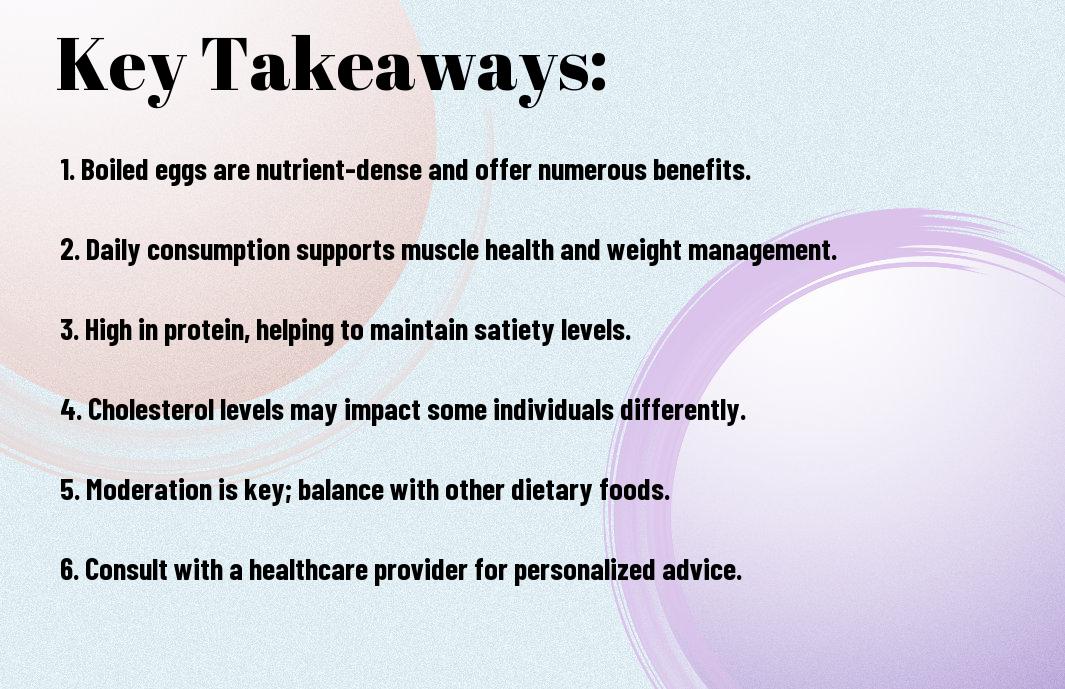Most people wonder if eating boiled eggs daily is beneficial or harmful to their health. While eggs are a nutrient-dense food packed with protein, vitamins, and minerals, they also contain cholesterol, which can lead to concerns about heart health. This blog post researchs into scientific insights that help you understand whether including boiled eggs in your daily diet can support your wellness goals or pose potential risks. By the end, you’ll have a clearer picture of how this popular food fits into your nutrition plan.
Key Takeaways:
- Boiled eggs are highly nutritious, providing a good source of protein, vitamins, and minerals, making them a healthful addition to daily diets.
- Consuming eggs in moderation is generally safe for most individuals, as research suggests they have minimal impact on cholesterol levels for healthy people.
- Incorporating boiled eggs into a balanced diet can support weight management and promote feelings of fullness, aiding in overall dietary adherence.

Nutritional Benefits of Boiled Eggs
The nutritional benefits of boiled eggs are impressive, making them a popular choice for many health-conscious individuals. Packed with crucial nutrients, these eggs are low in calories yet high in protein, vitamins, and minerals, offering a well-rounded addition to your diet. Consuming boiled eggs daily can support muscle maintenance and overall health, providing you with sustained energy throughout your day.
Rich Source of Protein
One significant advantage of boiled eggs is their role as a rich source of protein. Each egg contains around 6-7 grams of high-quality protein, which is vital for muscle repair and growth. By incorporating boiled eggs into your daily meals, you can easily meet your protein needs, especially if you lead an active lifestyle.
Vitamins and Minerals
About vitamins and minerals, boiled eggs offer a host of crucial nutrients that your body needs to function optimally. They contain Vitamin B12, important for red blood cell formation and neurological function, as well as Vitamin D, which plays a critical role in bone health. Additionally, eggs are an excellent source of selenium and choline, both of which contribute to antioxidant defense and brain development.
Eggs provide a rich array of vitamins and minerals that can greatly enhance your nutritional intake. The presence of folate in eggs helps in DNA synthesis and repair, while B vitamins assist in energy metabolism. Moreover, the significant levels of iron and zinc present contribute to immune health and cellular function, showcasing boiled eggs as a nutrient-dense addition to your meals.

Health Risks of Daily Consumption
Assuming you consume boiled eggs every day, you should be aware of the potential health risks involved. While they are a nutritious option, daily intake can lead to certain complications, depending on your individual health status and dietary balance. Evaluating these risks is important for maintaining overall well-being.
Cholesterol Levels
Cholesterol levels can be affected by your daily consumption of boiled eggs. Eggs are naturally high in dietary cholesterol, which could influence your blood cholesterol levels. For most people, moderate egg consumption doesn’t raise cholesterol significantly, but individuals with existing cholesterol issues should monitor their intake closely.
Potential Allergies
Between an estimated 1.5% to 2% of children facing egg allergies, you should be aware of the possibilities. While many outgrow this allergy by adolescence, some adults continue to experience adverse reactions. Symptoms can range from mild skin rashes to severe respiratory problems, necessitating caution.
Indeed, egg allergies can lead to serious health issues. If you experience hives, swelling, or difficulty breathing after consuming eggs, it’s vital to seek medical attention immediately. Moreover, high-risk individuals should consult healthcare professionals for advice on safely including eggs in your diet. Understanding these potential reactions can help you make more informed dietary choices and prioritize your health.

Moderation and Balance
Many health experts agree that incorporating boiled eggs into your diet can be beneficial if done in moderation. Eggs are a highly nutritious food source, packed with protein, vitamins, and minerals. However, eating them excessively may lead to increased cholesterol levels and other health risks. It’s important to maintain balance in your meals by combining eggs with a variety of other healthy foods, ensuring a well-rounded diet that supports your overall health.
Recommended Daily Intake
Before making eggs a staple in your diet, consider the recommended daily intake. Generally, consuming up to one egg per day is advised for most individuals. This allows you to enjoy the health benefits of eggs while managing your cholesterol levels effectively. However, personal factors such as your overall diet, activity level, and individual health status may influence this recommendation.
Combining with Other Foods
Recommended combinations of boiled eggs with other foods can enhance your meals and overall nutrition. By pairing eggs with a variety of fruits, vegetables, whole grains, and healthy fats, you can create well-balanced meals that provide important nutrients.
Intake of boiled eggs can be more beneficial when you combine them with nutrient-dense foods like spinach, avocado, or whole-grain toast. This not only amplifies the overall nutritional profile of your meals but also helps you avoid reliance on a single food type. Incorporating a diverse range of foods ensures you receive a balanced mix of vitamins, minerals, and other nutrients important for your health, promoting well-being and minimizing dietary risks.
Scientific Research on Egg Consumption
Keep in mind that the debate on egg consumption is extensive, as scientific research continues to explore its nutritional impact on health. Various studies highlight both the benefits and potential concerns linked to eating eggs daily, especially concerning cholesterol levels and overall diet quality.
Studies Supporting Daily Intake
Daily consumption of boiled eggs has been backed by studies indicating numerous health benefits, such as improved satiety and weight management, along with vital nutrients like protein, vitamins, and minerals. In moderate amounts, eggs are associated with a lower risk of heart disease while satisfying your nutritional needs efficiently.
Studies Suggesting Caution
After reviewing multiple studies, some suggest a need for caution regarding daily egg intake, particularly due to their cholesterol content. While eggs are nutrient-rich, high consumption could elevate cholesterol levels for some individuals, potentially increasing the risk of cardiovascular issues.
Indeed, various studies point out that excessive egg consumption could lead to elevated levels of LDL cholesterol, particularly in individuals sensitive to dietary cholesterol. Additionally, eating more than seven eggs per week may be associated with a higher risk of cardiovascular disease for some people. Therefore, being mindful of your overall dietary habits and cholesterol levels is important to making informed decisions about including eggs in your daily meals.
Boiled Eggs in Different Diets
After exploring the nutritional benefits of boiled eggs, you may wonder how they fit into various dietary patterns. Due to their rich protein content and healthy fats, boiled eggs can be an excellent addition to many diets, providing crucial nutrients while helping you maintain satiety. From low-carb approaches to heart-healthy choices, boiled eggs offer versatility and numerous benefits across different eating plans.
Keto and Low-Carb Diets
On a keto or low-carb diet, boiled eggs can be a staple food due to their high fat and protein content while containing minimal carbohydrates. They support ketosis, help keep you full, and provide crucial vitamins and minerals that assist in maintaining your energy levels throughout the day.
Mediterranean Diet
Between the variety of nutrient-dense foods recommended in the Mediterranean diet, boiled eggs also play a significant role. This diet emphasizes whole foods, healthy fats, and lean proteins, aligning perfectly with the nutrient profile of boiled eggs. Including them in your meals can help you achieve a balanced intake of crucial nutrients while enjoying the diverse flavors of the Mediterranean region.
Another appealing aspect of the Mediterranean diet is that it promotes heart health and weight management. The inclusion of boiled eggs can enhance your protein intake while being part of a diet that favors fruits, vegetables, and whole grains. Boiled eggs provide crucial amino acids and nutrients like vitamin D and choline, which support brain and liver function. Overall, including boiled eggs in this diet can contribute positively to overall wellness, making it a smart choice for your daily meals.
Practical Tips for Including Boiled Eggs
Despite the many benefits of boiled eggs, it’s important to incorporate them into your diet wisely. Here are a few practical tips:
- Start your day with a breakfast of boiled eggs and toast.
- Prepare them in advance and store them for quick snacks.
- Add boiled eggs to salads for protein and flavor.
- Experiment with different spices and seasonings to enhance taste.
Assume that you include them regularly for the best health benefits.
Cooking Methods
With several ways to cook boiled eggs, you can choose the method that best fits your schedule. You can use the classic stovetop boiling technique, the microwave for quick results, or even an Instant Pot for precise timing. Each method allows for personal adjustments, such as cooking time for soft or hard-boiled results, ensuring you enjoy your eggs just the way you like them.
Creative Recipe Ideas
Any meal can benefit from the addition of boiled eggs, transforming classic dishes into hearty options. For breakfast, add them to avocado toast for a nutritious start. Create a simple egg salad with mustard and herbs for a nutritious lunch. You can even slice boiled eggs and throw them on top of noodles or grain bowls for added texture and protein.
But don’t let those boiled eggs go underappreciated! Feel free to think outside the box and incorporate them into snacks or appetizers. For instance, try making deviled eggs with a twist, using ingredients like avocado or sriracha, enhancing both flavor and health benefits. Another *strong* option is adding boiled eggs to your favorite *strong* stir-fry dishes, where they provide *strong* protein and a food-safe way to elevate your meal. With various approaches, you can enjoy this versatile ingredient while boosting your overall diet.
To wrap up
Summing up, incorporating boiled eggs into your daily diet can be a beneficial choice due to their high protein and nutrient content. You’ll find that they offer crucial vitamins and support overall health when consumed in moderation. However, it’s important to balance your diet with various foods to ensure you’re meeting all your nutritional needs. Listen to your body and consult with a healthcare professional if you have concerns about cholesterol or dietary restrictions. Enjoying boiled eggs regularly can be part of a healthy lifestyle when approached thoughtfully.
FAQ
Q: Is it healthy to eat boiled eggs every day?
A: Eating boiled eggs every day can be part of a healthy diet for most individuals. Eggs are a great source of high-quality protein, vitamins, and crucial nutrients like vitamin D and choline. They are low in calories and can promote feelings of fullness. However, moderation is key, and it’s important to balance them with other foods to ensure a varied intake of nutrients.
Q: How many boiled eggs can I safely eat in a day?
A: While dietary recommendations can vary, general guidance suggests that most people can safely consume up to one whole egg per day. If you have specific health concerns, such as cholesterol issues, it may be wise to consult with a healthcare provider for personalized advice. The key is to listen to your body and maintain a balanced diet.
Q: Do boiled eggs contribute to high cholesterol levels?
A: Eggs were once believed to significantly impact blood cholesterol levels, primarily due to the cholesterol content in the yolks. However, recent research indicates that for most individuals, dietary cholesterol has a minimal effect on blood cholesterol levels. It’s more important to focus on overall dietary patterns and saturated fat intake. If you are concerned about cholesterol, consider discussing your diet with a healthcare professional.
Q: What nutritional benefits do boiled eggs offer?
A: Boiled eggs are rich in various nutrients. They provide high-quality protein, which is crucial for muscle maintenance and repair. Additionally, they are a good source of B vitamins, vitamin D, choline, and selenium, which support brain function, bone health, and immune function. The presence of healthy fats also helps with the absorption of fat-soluble vitamins.
Q: Can eating boiled eggs every day lead to any negative health effects?
A: For most healthy individuals, consuming boiled eggs daily is unlikely to lead to negative health effects. However, overconsumption can lead to increasing cholesterol intake, which may be a concern for some. Additionally, if a diet heavily relies on eggs without including sufficient fruits, vegetables, and whole grains, it may lack diversity in crucial nutrients. It’s important to maintain a balanced diet to promote overall health.
